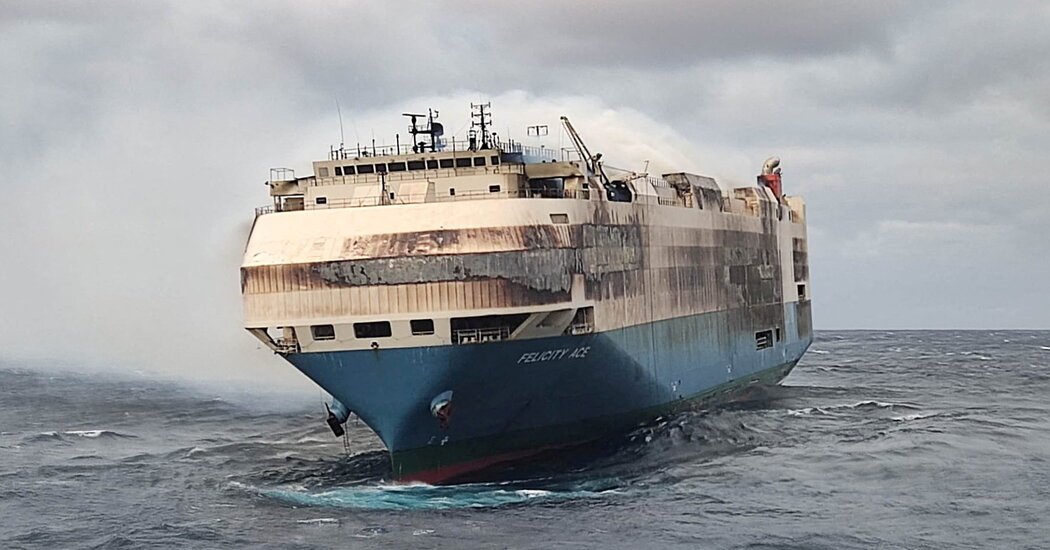The ship, the Felicity Ace, was carrying about 4,000 vehicles, including Bentleys and Porsches, when it caught fire on Feb. 16. On Tuesday morning, it sank.
Two weeks after catching fire, a mammoth ship that was transporting thousands of luxury cars sank on Tuesday morning about 253 miles off the Azores, according to the company that managed the vessel.
The ship, the Felicity Ace, went down at about 9 a.m. local time after tilting starboard, plunging about 4,000 cars — including more than 1,000 Porsches and 200 Bentleys — into the sea, according to the company, MOL Ship Management.
Environmental groups had been deeply concerned that the ship would sink and about the pollution it would cause in the unique ecosystem of the Azores, the Portuguese archipelago in the North Atlantic, where the seabed is covered with coral reefs, coral forests and sponges.
The area is home to sperm whales, blue whales, humpback whales, dolphins and sharks, among other species, according to Oceana, an environmental group.
A massive vessel like the Felicity Ace can hold more than three million liters of heavy fuel, as well as oil, according to Oceana. Other pollutants in a boat include electrical wires, paint and plastics.
A fire broke out in the ship’s cargo hold six days after it departed from Emden, Germany, for the port of Davisville in Rhode Island. MOL Ship Management has not said how or why the fire started.
Nearby commercial ships and a helicopter rescued the ship’s 22 crew members. No one was injured during the evacuation.
But the Felicity Ace, which is 650 feet long, remained aflame and billowed smoke, adrift off the shore of Western Europe.
There were several efforts to extinguish the fire and assess the damage to the vessel.
Photos shared by the Portuguese Navy showed the vessel consumed by white smoke. One photo showed a smaller boat spraying water onto the Felicity Ace. The midsection of the ship appeared to be scorched.
The Portuguese Navy said on Friday that a team of experts had arrived by helicopter the day before. MOL Ship Management said that a large salvage tugboat had started towing the Felicity Ace to “a safe area” off the Azores.
“The ship, apparently stable, has no fires on the outside or inside, although there is a high temperature in the central area, with no smoke in its structure,” the Navy said at the time.
But Tuesday morning, as the ship was being towed, it “lost stability and sank,” according to the Portuguese Navy.
“A small patch of oily residue” was visible and was being dispersed by the water jets of the tugboats, the Navy said. The area was being monitored by Portuguese and European environmental officials, the Navy said in a statement.
Angus Fitton, a spokesman for Porsche Cars North America Inc., expressed relief that the members of the Felicity Ace’s crew were “safe and well” and said the company was “supporting our customers as best we can.”
“We are already working to replace every car affected,” he said, “and the first cars will be built soon.” Mr. Fitton did not say when that would be.
One of the Porsches aboard belonged to Matt Farah, a car enthusiast and the editor of The Smoking Tire.
He had been waiting for the car, a 2022 metallic Boxster Spyder with a retail price of about $123,000, since August.
Mr. Farah summarized the loss on his podcast: “Car. Boat. Fire. Adrift. Like, that’s the entire story.”
Maritime specialists said that even if the vessel had been saved, the cars aboard would most likely have been scrapped.
“Once it’s been on board a ship that’s on fire, no one can tell you much about the integrity of the car,” said Richard Burke, a professor and chairman of naval architecture and marine engineering at the State University of New York Maritime College. “So if you can’t do that, why would you agree to a warranty contract on that car?”
Mr. Farah, on his podcast, agreed.
“If it’s not the fire, it’s the molten lithium,” he said. “If it’s not the molten lithium, it’s the smoke. And if it’s not the smoke, it’s the seawater.”
Dr. Burke noted that fires on car carriers could be extremely challenging to extinguish because the vessels typically carried thousands of vehicles and each vehicle would have a gallon of gasoline, a half a gallon of motor oil and four rubber tires that can burn.
“They’re really difficult fires; they’re terrible,” Dr. Burke said, adding, “Once the fire gets going, the crew doesn’t have a lot of chance of putting the fire out.”
In December 2018, another 650-foot car carrier, the Sincerity Ace, caught fire in the Pacific Ocean, about 2,000 miles northwest of Oahu, in Hawaii, while transporting about 3,500 Nissan vehicles from Japan, according to The Honolulu Star-Advertiser.
Mr. Farah, who discusses cars for three hours each week on his show, said in an email that given the state of the world, the loss of a Porsche felt minor.
“There is a global pandemic that people just want to pretend doesn’t exist and move on from, and we are about to have World War III,” he wrote before the vessel sank. “I feel much worse about those things than I do about my dumb car.”
Michael Levenson contributed reporting.


























